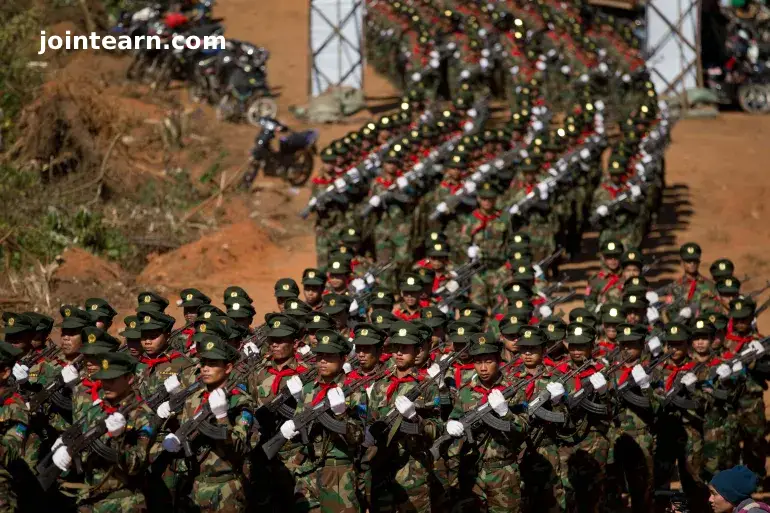
The Ta’ang National Liberation Army agrees to pull out from Mogok and Momeik after months of fierce clashes.
KUNMING/YANGON, October 29, 2025 — Myanmar’s Ta’ang National Liberation Army (TNLA) has agreed to withdraw from two key towns following a China-mediated truce aimed at ending months of heavy fighting between rebel forces and the military junta in the country’s north.
The TNLA announced Tuesday that it had signed a ceasefire agreement with Myanmar’s military government after several days of negotiations in Kunming, China, roughly 400 kilometres from the Myanmar border.
Under the terms of the deal, the rebel group will pull out of the ruby-mining hub of Mogok in upper Mandalay and the nearby town of Momeik in northern Shan State. Both sides also agreed to cease further advances beginning Wednesday and to halt air strikes across contested areas.
“This agreement marks a crucial step toward de-escalation,” a TNLA spokesperson said, though the group did not specify when the withdrawal would be completed.
The Myanmar military, also known as the Tatmadaw, has not yet released an official statement on the truce.
Background: Months of Conflict and Shifting Frontlines
The TNLA is one of the three main ethnic armed organisations forming the Three Brotherhood Alliance (3BA) — alongside the Myanmar National Democratic Alliance Army (MNDAA) and the Arakan Army (AA).
Since launching Operation 1027 in October 2023, the alliance has seized control of vast territories across northeastern Shan State and western Myanmar, marking one of the military’s most significant territorial losses since its 2021 coup.
The TNLA alone captured 12 towns during its northern offensive, including strategic hubs critical to military logistics and trade routes linking China to Myanmar. However, its advances slowed in 2024 after several China-brokered ceasefires, which allowed the army to recapture key strongholds, including Lashio (April 2025), Nawnghkio (July), and Kyaukme and Hsipaw (October).
“China’s mediation has been instrumental in preventing a wider escalation, though these truces remain fragile,” said a regional security analyst in Bangkok.
China’s Strategic Role
China remains the primary power broker in the Myanmar conflict, wielding influence over both the junta and the ethnic armed groups operating along its southern border.
Beijing has significant economic interests in Myanmar, including infrastructure projects under the China–Myanmar Economic Corridor (CMEC) and investments in jade and rare earth mining.
As the Myanmar military prepares for controversial elections on December 28, China is believed to be pushing for temporary stability to protect its investments and cross-border trade routes.
“Beijing’s involvement is pragmatic — it wants a stable buffer zone and uninterrupted access to natural resources,” explained the analyst. “It is not about supporting democracy or the junta, but securing its own borders.”
Growing Tensions Before Elections
The truce comes as Myanmar’s military government, led by Senior General Min Aung Hlaing, attempts to project control ahead of elections that many observers have already dismissed as illegitimate.
The Union Solidarity and Development Party (USDP) — the junta’s political arm — has begun campaigning, but voting is expected to be impossible in rebel-held territories, including much of Shan, Kachin, and Rakhine states.
“The elections are a façade meant to legitimise continued military rule,” said a Yangon-based political scientist. “No real opposition can participate while the country remains at war.”
Humanitarian Impact
The conflict has displaced hundreds of thousands of civilians, particularly in Shan State, where entire villages have been destroyed by artillery and air strikes.
Aid agencies warn that many communities remain cut off from humanitarian access due to the fighting, with food shortages and medical crises growing worse.
The new truce, if it holds, could provide a brief humanitarian window for relief operations, especially in Mogok and Momeik, where hospitals and schools have been shuttered for months.
“People are exhausted,” said a local teacher in Momeik. “Even one week of peace could allow us to get food and medicine to those trapped in the hills.”
Outlook
While the China-brokered truce is seen as a short-term relief, analysts warn that long-term peace remains elusive without a nationwide dialogue involving ethnic groups, pro-democracy forces, and the military.
The Three Brotherhood Alliance has not indicated whether it will pursue broader peace talks, and many rebel leaders still view the military as an illegitimate authority following the 2021 coup that ousted Aung San Suu Kyi’s civilian government.
“Every ceasefire in Myanmar’s history has been temporary,” noted a senior researcher at the International Crisis Group. “Sustainable peace will require addressing ethnic autonomy and political representation — issues the junta refuses to discuss.”


Leave a Reply